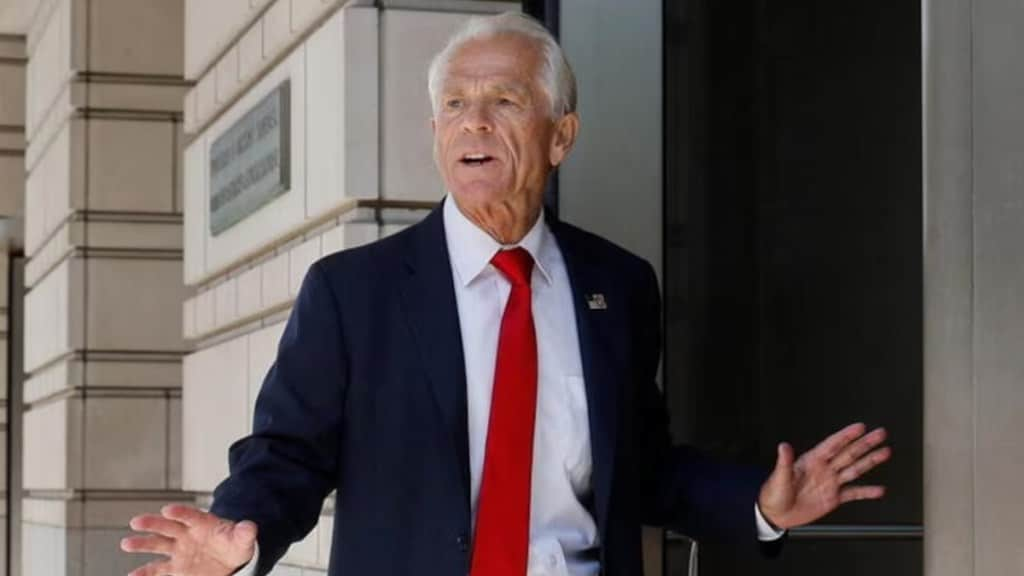White House Trade Adviser Peter Navarro continued his vehement criticism of India on Monday — insisting that Prime Minister Narendra Modi was “getting into bed with Vladimir Putin and Xi Jinping”. He also accused the Brahmin community of “profiteering from Indian people” and reiterated support for the 50% tariffs imposed by US President Donald Trump. The remarks came even as Modi attended the SCO Summit in China and held bilateral meetings with Putin and Xi.
The statement has ignited a storm on social media with numerous politicians calling out the ‘shameful’ and ‘anti-Hindu, anti-India narrative’ pushed by Navarro. Some brought up the ‘Boston Brahmin’ concept to suggest that the White House official was being misinterpreted. Opposition leader Priyanka Chaturvedi (and a few others) however countered that the remarks could not be dismissed as accidental or ignorant. They argued that Navarro had indeed been referring to the Hindu Brahmin community in his bizarre diatribe against Indian caste groups.
“The usage of the word Brahmin (yes elite Boston Brahmins US context am aware) by someone senior in US Administration cannot come out of the blue in India’s context, this was deliberate. So please sit out on explaining this one,” Chaturvedi wrote on X.
The term had also surfaced on social media earlier this year (in case you were wondering why it sounded familiar) as netizens delved into the lives of Kristin Cabot and Andy Byron amidst the Coldplay jumbotron scandal. The HR head of Astronomer had reportedly married into an influential and wealthy family belonging to the ‘Boston Brahmin’ community.
What did Navarro say?
Navarro had sparked outrage on Sunday after accusing ‘Brahmins’ in the country of “profiteering at the expense of the Indian people”. He also echoed his oft-repeated claim that New Delhi was a “laundromat for the Kremlin” during the interview with Fox News. Navarro also defended the 50% tariff imposed by US President Donald Trump, and claimed that India was enabling trade imbalances and geopolitical alliances that went against US interests.
“25% or 50% is because India is the Maharaja of tariffs. They have the highest tariffs in the world. They won’t let us sell to them…so who gets hurt? Workers in America, taxpayers in America…Ukrainians in cities are getting killed by Russian drones. So, you know, look, Modi’s a great leader… But I don’t understand why he’s getting into bed with Putin and Xi Jinping…when he’s the leader of the biggest democracy in the world. I would just simply say to the Indian people. Please, understand what’s going on here. You’ve got Brahmins profiteering at the expense of the Indian people. We need that to stop,” he said.
Who are Boston Brahmins?
The moniker was coined in the 1860s by writer and physician Oliver Wendell Holmes Sr and based loosely on the eponymous upper caste Hindu community. He had compared the old elites of Boston — the closest thing to an American aristocracy — to the Indian Brahmins. Holmes cited their ancestral prestige, societal connections, philanthropy, and dignified manner to underscore his point. It was first used in the 1861 novel Elsie Venner where Holmes described them as the “Brahmin caste of New England” — a “harmless, inoffensive, untitled aristocracy” within the rarefied American circles.
“There are races of scholars among us, in which aptitude for learning, and all these marks of it I have spoken of, are congenital and hereditary. Their names are always on some college catalogue or other. They break out every generation or two in some learned labor which calls them up after they seem to have died out. At last some newer name takes their place, it maybe,—but you inquire a little and you find it is the blood of the Edwardses or the Chauncys or the Ellerys or some of the old historic scholars, disguised under the altered name of a female descendant,” Holmes explained.

